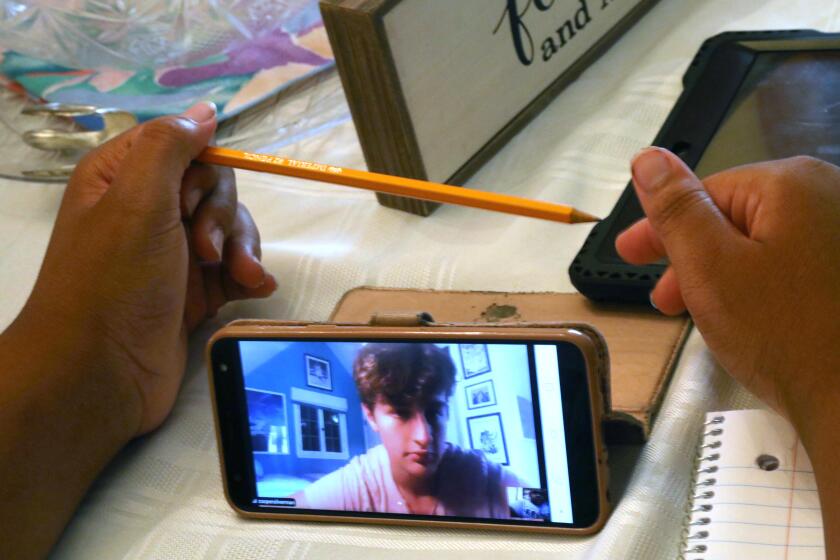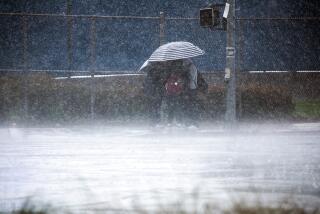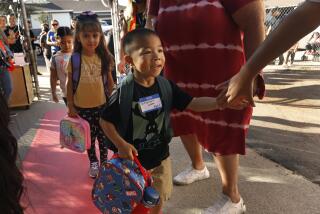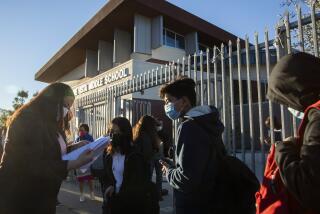Hereâs the latest on when schools can reopen in L.A. County
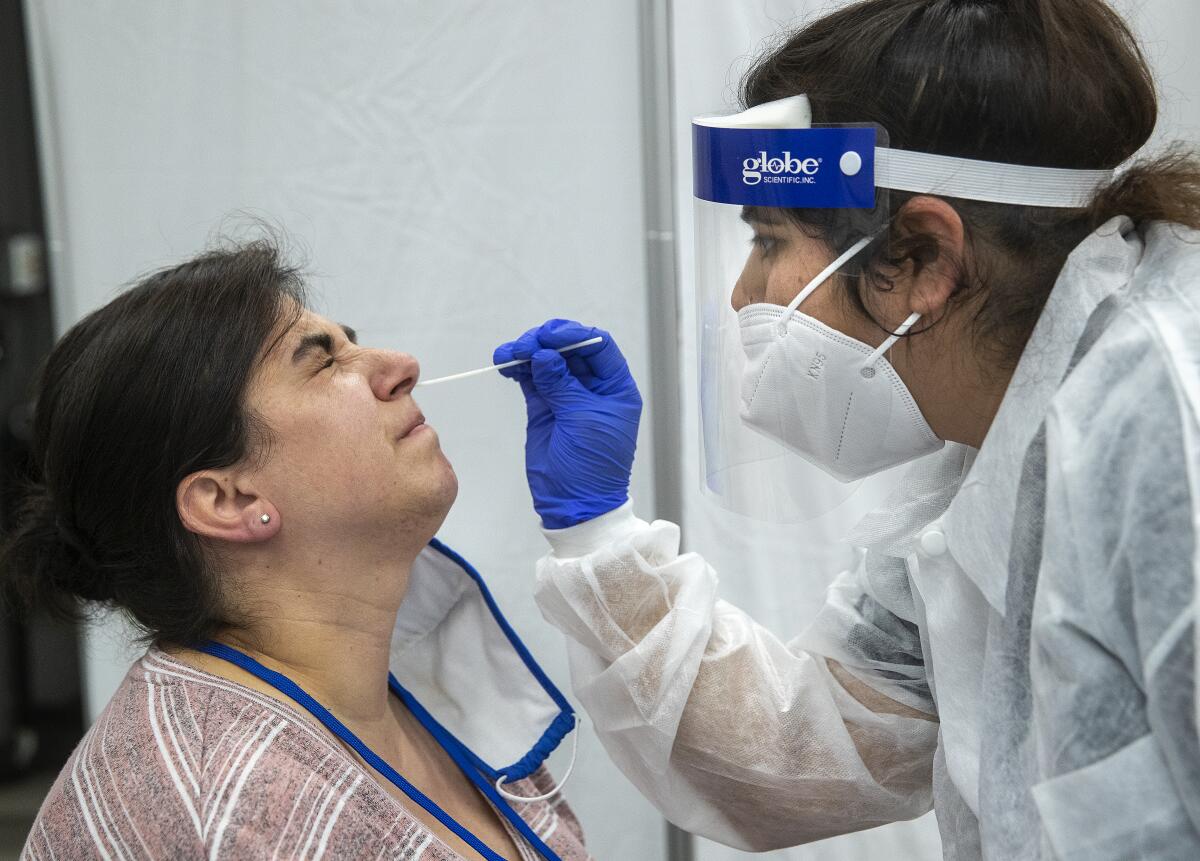
Unfortunately, thereâs no simple answer in Los Angeles County to the pressing question: When will my childâs school reopen?
Much depends on public health guidelines amid the coronavirus pandemic, and on decisions by leaders of the countyâs 80 school districts. Here are the issues at play in what is emerging as a confusing patchwork of rules and policies.
What determines whether a school can reopen for in-person instruction?
Under state rules, all campuses can open for all students 14 days after a county enters the red â or second â tier in the stateâs system for determining the level of coronavirus restrictions. But L.A. County health authorities can impose further restrictions that would delay campus reopenings.
For now, L.A. County remains in the purple â or first â tier meaning that campuses cannot reopen for all students. For a county to enter the next tier â the red â it must qualify for this tier for two weeks. Once the county is officially in the red tier, it must stay in that tier for two more weeks before schools can reopen. A setback could restart the clock.
For L.A. County, this means campuses could not reopen until well into November at this time. But it may be later due to continuing high infection rates or county discretion.
Once campuses do reopen, however, they can remain open unless an outbreak at a school or multiple district schools is severe enough to warrant closing.
What are the exceptions that allow some students to return to campus?
The exceptions apply to childcare, camps, athletics and some other activities, small groups with special needs, and elementary schools that successfully apply for waivers.
Small groups: A school can bring back up to 10% of students on campus at a time if they have special needs, such as students with disabilities or students who are learning English â both groups have suffered particularly without in-person contact with teachers or specialists who provide services.
School officials have some latitude in defining special needs. In L.A. Unified, for example, an Oct. 8 agreement between the teachers union and school district also designates gifted students as having special needs, according to the union.
Also, more than 10% of students can be served, provided that only 10% are on campus at any given time. Parents should contact their teacher and school to see if their child qualifies for special services in person. The demand for these services is likely to surpass the availability. Parents may need to be assertive or enlist the help of advocacy groups, some of which are listed lower in this article.
Childcare/camp: A school can offer childcare that looks a lot like school, except the teacher is in another location interacting with students online while a different adult supervises the students in person. The class is still conducted remotely, online â even if the students are in a classroom.
Waivers: Schools can apply for waivers to resume in-person instruction for kindergarten and first and second grades. This exception recognizes that younger children have particular difficulties with online learning. Schools are not required to apply for waivers.
L.A. County has imposed waiver conditions beyond what the state is requiring. Although the state allows waivers to open in-person classes through sixth grade, L.A. County is stopping at second grade. The county also is prioritizing schools with higher numbers of low-income families. Finally, the county requires agreement from all labor unions at a school or district â and consent from a majority of employees when there are no unions.
The county has committed to processing about 30 waiver requests per week, with the first approvals expected toward the end of October.
Non-union private schools, including schools in the Archdiocese of Los Angeles, are expected to pursue waivers actively.
Athletics: If permitted by the school district, students can come on campus in small groups for individual conditioning exercises outdoors â following protocols on physical distancing. They cannot take part in group activities or play team sports. The protocols for athletics also could apply to other group activities, such as cheer or dance teams or marching bands.
L.A. Unified has been more restrictive than some other school systems in L.A. County on this front; voluntary sports conditioning wonât begin before Nov. 2, according to tentative plans released on Oct 8.
Who is applying for waivers so far?
The vast majority of applications are from private schools. As of Oct. 9, the county had received 50 applications: 43 from private schools; one from a charter school; and six from traditional public schools, representing more than one school system.
Whatâs going on in L.A. Unified?
One-on-one tutoring officially began Oct. 5 â eight weeks into the school year.
The agreement reached by the district and teachers union does not cover small-group instruction for students with special needs, which some other districts are offering or preparing to offer. L.A. Unified and union officials stress the need to work through ongoing safety issues, while some advocates assert that L.A. Unified should be helping more students receive in-person instruction. Itâs not clear whether enough teachers will volunteer to meet the demands for tutoring.
L.A. Unified has not applied for waivers.
The nationâs second-largest school system is not alone in its cautious approach. Long Beach Unified, the countyâs second-largest district, already has ruled out a general reopening before January, even if the county permits it. L.A. Unified has not ruled out an earlier return to campus.
Long Beach is, however, planning to move forward with small-group instruction for students with special needs.
High school and college students are volunteering to address the educational gap between those who can afford private tutors and those who canât.
Does there need to be COVID-19 testing before students can return to campus?
The county does not require it, but your school or school district might. L.A. Unified has set up a testing program, and it expects students to take two tests â one for baseline research â and a second test before returning to on-campus instruction. After that, itâs not clear how often testing will take place.
Itâs also not clear if a district can legally require all students to be tested, but L.A. Unified will continue to provide online-only instruction for families who decline COVID-19 testing or who donât wish to return to campus. All school systems must provide an online-only option for the current school year.
Does my school have to offer tutoring or small-group classes for students with special needs?
No. That is up to the local school or school district.
What is the role of unions in these decisions?
Unions have the right in California to negotiate over working conditions, such as amended rules for safety and teaching during the pandemic. If talks fail in a typical contract negotiation, an employer can impose a labor agreement and a union can strike. The coronavirus-related legal parameters are uncertain.
Why is my school closed and one down the street appears to be open?
Different schools and districts can make their own decisions about whether to offer tutoring and small-group instruction for students with special needs. Some private organizations are offering childcare or camps on school sites, and some look more like regular school than others.
In some cases, parents and teachers have questioned the legality of schools that appear to be providing in-person classes simply by calling it something else.
Thereâs a number to call if you feel a school is violating health orders: (888) 700-9995.
If the infection rate in my neighborhood is low compared with the rate in other places, will my neighborhood school be allowed to reopen sooner?
Probably not. The county, so far, is not inclined to open schools in a piecemeal fashion. Health officials have noted that school employees â and many students â are likely to come from outside the neighborhood in which a school is located.
Tutoring could be the solution to learning losses brought on by coronavirus-forced school closures. But students who need it the most have the least access.
For the L.A. school system, whom can I contact to help me advocate for my child?
Here are a sampling of groups that advocate for students and parents:
- 10th District Parent Teachers Students Assn.
- Community Coalition
- Communities in Schools Los Angeles
- Families in Schools
- InnerCity Struggle
- Parent Revolution
- Students Deserve
- Disability Rights California
Within the district, contact the office of your school board member or the Parent and Community Services branch. For issues with L.A. Unified-authorized charter schools, contact the charter division.
If you have additional questions to which youâd like us to find answers, please send an email to [email protected]. We also welcome your input in keeping this information accurate and up to date.
More to Read
Sign up for Essential California
The most important California stories and recommendations in your inbox every morning.
You may occasionally receive promotional content from the Los Angeles Times.
